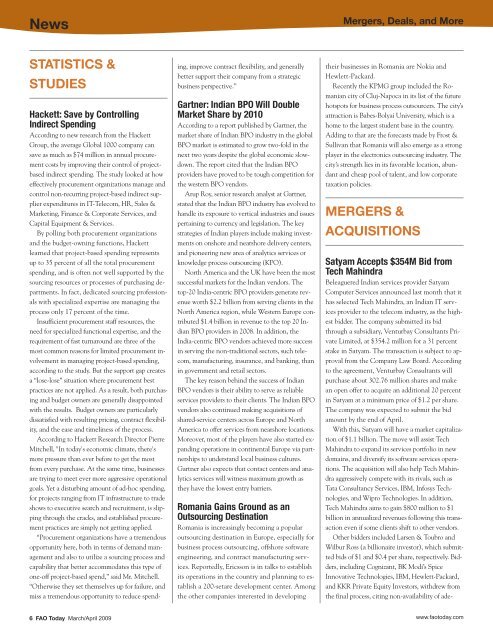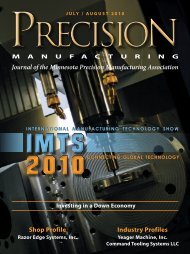March/April 2009 www.FAOToday.com
March/April 2009 www.FAOToday.com
March/April 2009 www.FAOToday.com
You also want an ePaper? Increase the reach of your titles
YUMPU automatically turns print PDFs into web optimized ePapers that Google loves.
News<br />
Mergers, Deals, and More<br />
STATISTICS &<br />
STUDIES<br />
Hackett: Save by Controlling<br />
Indirect Spending<br />
According to new research from the Hackett<br />
Group, the average Global 1000 <strong>com</strong>pany can<br />
save as much as $74 million in annual procurement<br />
costs by improving their control of projectbased<br />
indirect spending. The study looked at how<br />
effectively procurement organizations manage and<br />
control non-recurring project-based indirect supplier<br />
expenditures in IT-Tele<strong>com</strong>, HR, Sales &<br />
Marketing, Finance & Corporate Services, and<br />
Capital Equipment & Services.<br />
By polling both procurement organizations<br />
and the budget-owning functions, Hackett<br />
learned that project-based spending represents<br />
up to 35 percent of all the total procurement<br />
spending, and is often not well supported by the<br />
sourcing resources or processes of purchasing departments.<br />
In fact, dedicated sourcing professionals<br />
with specialized expertise are managing the<br />
process only 17 percent of the time.<br />
Insufficient procurement staff resources, the<br />
need for specialized functional expertise, and the<br />
requirement of fast turnaround are three of the<br />
most <strong>com</strong>mon reasons for limited procurement involvement<br />
in managing project-based spending,<br />
according to the study. But the support gap creates<br />
a “lose-lose” situation where procurement best<br />
practices are not applied. As a result, both purchasing<br />
and budget owners are generally disappointed<br />
with the results. Budget owners are particularly<br />
dissatisfied with resulting pricing, contract flexibility,<br />
and the ease and timeliness of the process.<br />
According to Hackett Research Director Pierre<br />
Mitchell, "In today's economic climate, there's<br />
more pressure than ever before to get the most<br />
from every purchase. At the same time, businesses<br />
are trying to meet ever more aggressive operational<br />
goals. Yet a disturbing amount of ad-hoc spending,<br />
for projects ranging from IT infrastructure to trade<br />
shows to executive search and recruitment, is slipping<br />
through the cracks, and established procurement<br />
practices are simply not getting applied.<br />
“Procurement organizations have a tremendous<br />
opportunity here, both in terms of demand management<br />
and also to utilize a sourcing process and<br />
capability that better ac<strong>com</strong>modates this type of<br />
one-off project-based spend,” said Mr. Mitchell.<br />
“Otherwise they set themselves up for failure, and<br />
miss a tremendous opportunity to reduce spending,<br />
improve contract flexibility, and generally<br />
better support their <strong>com</strong>pany from a strategic<br />
business perspective.”<br />
Gartner: Indian BPO Will Double<br />
Market Share by 2010<br />
According to a report published by Gartner, the<br />
market share of Indian BPO industry in the global<br />
BPO market is estimated to grow two-fold in the<br />
next two years despite the global economic slowdown.<br />
The report cited that the Indian BPO<br />
providers have proved to be tough <strong>com</strong>petition for<br />
the western BPO vendors.<br />
Arup Roy, senior research analyst at Gartner,<br />
stated that the Indian BPO industry has evolved to<br />
handle its exposure to vertical industries and issues<br />
pertaining to currency and legislation. The key<br />
strategies of Indian players include making investments<br />
on onshore and nearshore delivery centers,<br />
and pioneering new area of analytics services or<br />
knowledge process outsourcing (KPO).<br />
North America and the UK have been the most<br />
successful markets for the Indian vendors. The<br />
top-20 India-centric BPO providers generate revenue<br />
worth $2.2 billion from serving clients in the<br />
North America region, while Western Europe contributed<br />
$1.4 billion in revenue to the top 20 Indian<br />
BPO providers in 2008. In addition, the<br />
India-centric BPO vendors achieved more success<br />
in serving the non-traditional sectors, such tele<strong>com</strong>,<br />
manufacturing, insurance, and banking, than<br />
in government and retail sectors.<br />
The key reason behind the success of Indian<br />
BPO vendors is their ability to serve as reliable<br />
services providers to their clients. The Indian BPO<br />
vendors also continued making acquisitions of<br />
shared-service centers across Europe and North<br />
America to offer services from nearshore locations.<br />
Moreover, most of the players have also started expanding<br />
operations in continental Europe via partnerships<br />
to understand local business cultures.<br />
Gartner also expects that contact centers and analytics<br />
services will witness maximum growth as<br />
they have the lowest entry barriers.<br />
Romania Gains Ground as an<br />
Outsourcing Destination<br />
Romania is increasingly be<strong>com</strong>ing a popular<br />
outsourcing destination in Europe, especially for<br />
business process outsourcing, offshore software<br />
engineering, and contract manufacturing services.<br />
Reportedly, Ericsson is in talks to establish<br />
its operations in the country and planning to establish<br />
a 200-setare development center. Among<br />
the other <strong>com</strong>panies interested in developing<br />
their businesses in Romania are Nokia and<br />
Hewlett-Packard.<br />
Recently the KPMG group included the Romanian<br />
city of Cluj-Napoca in its list of the future<br />
hotspots for business process outsourcers. The city’s<br />
attraction is Babes-Bolyai University, which is a<br />
home to the largest student base in the country.<br />
Adding to that are the forecasts made by Frost &<br />
Sullivan that Romania will also emerge as a strong<br />
player in the electronics outsourcing industry. The<br />
city’s strength lies in its favorable location, abundant<br />
and cheap pool of talent, and low corporate<br />
taxation policies.<br />
MERGERS &<br />
ACQUISITIONS<br />
Satyam Accepts $354M Bid from<br />
Tech Mahindra<br />
Beleaguered Indian services provider Satyam<br />
Computer Services announced last month that it<br />
has selected Tech Mahindra, an Indian IT services<br />
provider to the tele<strong>com</strong> industry, as the highest<br />
bidder. The <strong>com</strong>pany submitted its bid<br />
through a subsidiary, Venturbay Consultants Private<br />
Limited, at $354.2 million for a 31 percent<br />
stake in Satyam. The transaction is subject to approval<br />
from the Company Law Board. According<br />
to the agreement, Venturbay Consultants will<br />
purchase about 302.76 million shares and make<br />
an open offer to acquire an additional 20 percent<br />
in Satyam at a minimum price of $1.2 per share.<br />
The <strong>com</strong>pany was expected to submit the bid<br />
amount by the end of <strong>April</strong>.<br />
With this, Satyam will have a market capitalization<br />
of $1.1 billion. The move will assist Tech<br />
Mahindra to expand its services portfolio in new<br />
domains, and diversify its software services operations.<br />
The acquisition will also help Tech Mahindra<br />
aggressively <strong>com</strong>pete with its rivals, such as<br />
Tata Consultancy Services, IBM, Infosys Technologies,<br />
and Wipro Technologies. In addition,<br />
Tech Mahindra aims to gain $800 million to $1<br />
billion in annualized revenues following this transaction<br />
even if some clients shift to other vendors.<br />
Other bidders included Larsen & Toubro and<br />
Wilbur Ross (a billionaire investor), which submitted<br />
bids of $1 and $0.4 per share, respectively. Bidders,<br />
including Cognizant, BK Modi’s Spice<br />
Innovative Technologies, IBM, Hewlett-Packard,<br />
and KKR Private Equity Investors, withdrew from<br />
the final process, citing non-availability of ade-<br />
6 FAO Today <strong>March</strong>/<strong>April</strong> <strong>2009</strong> <strong>www</strong>.faotoday.<strong>com</strong>
















